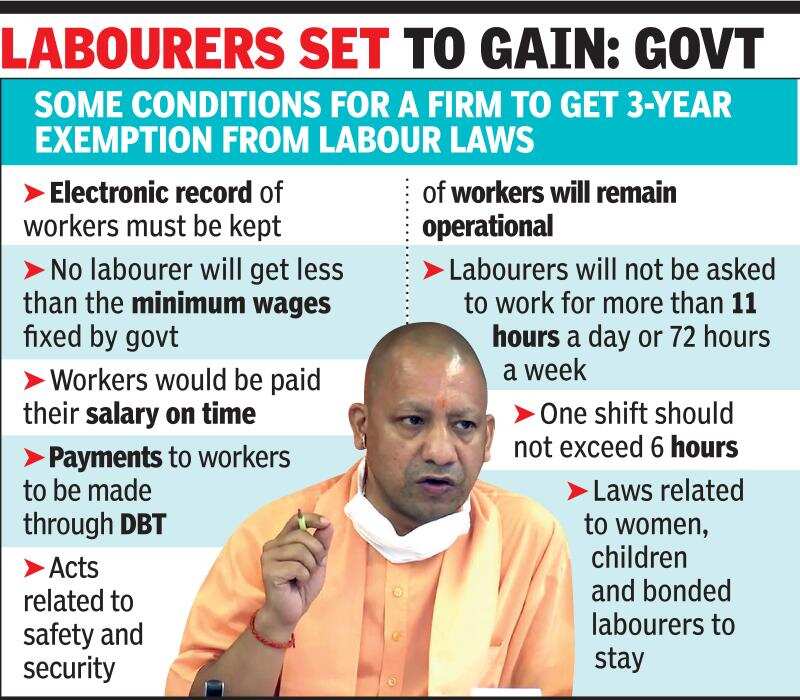
LUCKNOW: Generation of employment and attracting foreign investment are the two mainstays of UP government’s decision to suspend a majority of its labour laws for the next three years.
The move, said an official, would have a huge impact for MSMEs and given them the required push to recover from the economic slowdown due to the Covid-19 lockdown. Principal Secretary, MSME, Navneet Sehgal said that in order to attract foreign investment especially, the state needed to have a competitive environment visa-vis countries like Taiwan, Thailand and Bangladesh.

“The state is looking to generate employment while ensuring rights for workers. The changed laws will be applicable to either new industries or new recruitments in existing industries. It is necessary to encourage more MSMEs to set up and we are also planning changes in the MSME Act. Under that, a new unit may not have to take any clearances while setting up, up to three years and will be allowed to collect all NOCs and permissions during that time,” he said.
An official said that the new laws would ensure that upcoming units and industries would not hesitate in hiring people.
Rules applicable for 1,000 days
We have not diluted laws related to the minimum pay of Rs 15,000 per month and working hours. In other laws, we have given relief for three years and they will be applicable on new recruitments in old firms and new industries,” he said.
The government has clarified that the rules are applicable for 1,000 days to industries engaged in manufacturing and production, but with certain conditions. These include registration of names and details of workers electronically in attendance register as per section 62 of the Factory Act, 1948.
Besides, no worker will be paid less than the minimum wages and workers will be paid within a fixed time period. Their dues will be deposited in their bank accounts.
Act number 63 of Factories Act, 1948 pertaining to safety of factory and Building and Other Construction Workers (Regulation of Employment and Conditions of Service) Act, 1996 will remain in play, as will the Bonded Labour Act. Laws pertaining to employment of women and children will also continue to be followed.
The government has further clarified that no worker will be allowed to work for more than 11hours a day and more than 72 hours a week. Shifts should be organised in such a way that breaks are not more than six hours and in case of death or disability during an accident at work, compensation will be paid as per section 8 of the Workers Compensation Act, 1923 section.
The move, said an official, would have a huge impact for MSMEs and given them the required push to recover from the economic slowdown due to the Covid-19 lockdown. Principal Secretary, MSME, Navneet Sehgal said that in order to attract foreign investment especially, the state needed to have a competitive environment visa-vis countries like Taiwan, Thailand and Bangladesh.

“The state is looking to generate employment while ensuring rights for workers. The changed laws will be applicable to either new industries or new recruitments in existing industries. It is necessary to encourage more MSMEs to set up and we are also planning changes in the MSME Act. Under that, a new unit may not have to take any clearances while setting up, up to three years and will be allowed to collect all NOCs and permissions during that time,” he said.
An official said that the new laws would ensure that upcoming units and industries would not hesitate in hiring people.
Rules applicable for 1,000 days
We have not diluted laws related to the minimum pay of Rs 15,000 per month and working hours. In other laws, we have given relief for three years and they will be applicable on new recruitments in old firms and new industries,” he said.
The government has clarified that the rules are applicable for 1,000 days to industries engaged in manufacturing and production, but with certain conditions. These include registration of names and details of workers electronically in attendance register as per section 62 of the Factory Act, 1948.
Besides, no worker will be paid less than the minimum wages and workers will be paid within a fixed time period. Their dues will be deposited in their bank accounts.
Act number 63 of Factories Act, 1948 pertaining to safety of factory and Building and Other Construction Workers (Regulation of Employment and Conditions of Service) Act, 1996 will remain in play, as will the Bonded Labour Act. Laws pertaining to employment of women and children will also continue to be followed.
The government has further clarified that no worker will be allowed to work for more than 11hours a day and more than 72 hours a week. Shifts should be organised in such a way that breaks are not more than six hours and in case of death or disability during an accident at work, compensation will be paid as per section 8 of the Workers Compensation Act, 1923 section.
Quick Links
Kerala Coronavirus Helpline NumberHaryana Coronavirus Helpline NumberUP Coronavirus Helpline NumberBareilly NewsBhopal NewsCoronavirus in DelhiCoronavirus in HyderabadCoronavirus in IndiaCoronavirus symptomsCoronavirusRajasthan Coronavirus Helpline NumberAditya ThackerayShiv SenaFire in MumbaiAP Coronavirus Helpline NumberArvind KejriwalJammu Kashmir Coronavirus Helpline NumberSrinagar encounter
Get the app










